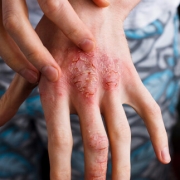Adverse Childhood Experiences Associated with Celiac Disease
 Stressful and traumatic experiences that occur in childhood may take their toll in adulthood in the form of celiac disease, new research has found.
Stressful and traumatic experiences that occur in childhood may take their toll in adulthood in the form of celiac disease, new research has found.
- Michael Vlessides, Gastroendonews.com 1
According to a team at McMaster University, this association highlights the need for psychosocial assessments in clinical gastroenterology practice, a step they say may improve understanding of the pathophysiology of celiac disease and care of patients with the condition.
“In earlier research, we showed an increased number of childhood early-life events among a group of patients with celiac disease, inflammatory bowel disease and inflammatory bowel syndrome,” said Carla Vanina Noejovich, MA, PhD, a research assistant at the Hamilton, Ontario, institution. “This study was an attempt to refine that earlier work.”
The investigators enrolled 44 adult patients into the pilot study; 25 had biopsy-proven celiac disease, and 19 were healthy controls matched on sex and age. Dr. Noejovich and her colleagues assessed early-life events using a modified version of the Adverse Childhood Experience Questionnaire. The researchers quantified the number of early-life events, as well as the presence and severity of gastrointestinal and extra-intestinal symptoms.
Presenting at the 2019 Canadian Digestive Diseases Week (abstract A149), Dr. Noejovich reported that whereas people with celiac disease had a median of seven early-life events, healthy volunteers reported a median of three (P=0.003).
- “This doesn’t mean the healthy volunteers didn’t have stressful events; we all have them,” Dr. Noejovich told Gastroenterology & Endoscopy News. “But the people with celiac disease had significantly more.”
The most common early-life events were substance abuse among family members during childhood (celiac disease vs. healthy controls; P=0.006) and neglectful parenting (celiac disease vs. healthy controls; P=0.026). The analysis also revealed a moderate correlation between early-life events and the severity of constipation (r2=0.55; P=0.01).
No association was found, however, between early-life events and diarrhea, abdominal pain or extra-intestinal symptoms, according to the researchers.
Dr. Noejovich said although the results of the study are preliminary, they indicate that psychological interventions may one day prove beneficial in people with celiac disease.
“Not every celiac disease patient has severe symptoms, but those severe symptoms may be an indication that something else is going on,” she said. “And maybe simply giving them access to therapy might be enough to help curb their symptoms. Wellness strategies are helpful for everyone,” she added. “And now that we know that the occurrence and symptomology of celiac disease might be due to increased stress, practicing some wellness activities in our daily lives might be helpful.”
Stefano Guandalini, MD, a celiac expert at the University of Chicago, said early-life stressors likely interact with genetic predispositions. “This includes
- delivery by C-section,
- frequent viral infections in the first couple of years of life,
- use of antibiotics,
- a large amount of gluten in the first two years,
- and a diet rich in red meats, fats and refined sugars.”
- “Most or all of these factors appear to be mediated by dysbiosis. By what mechanisms stressful events in early life can favor the development of celiac disease is unclear, but one may speculate that in this case, too, perturbances of the gut microbiota related to the stress may be at play.”
Jason Tye-Din, MD, PhD, the head of the celiac research laboratory at the Walter and Eliza Hall Institute of Medical Research, in Parkville, Australia, called the findings “intriguing.”
- “Psychological manifestations such as anxiety and depression are well reported in patients with established celiac disease, and there is good evidence to support a role for psychological counseling, although this tends to be underdone in real-world practice,” Dr. Tye-Din said.
Larger, prospective studies are needed to confirm the relationship. “If confirmed, this would set the scene for interesting future research to define the specific trigger and how the adverse effects are mediated,” he added.
Drs. Guandalini, Noejovich and Tye-Din reported no relevant financial conflicts of interest.













